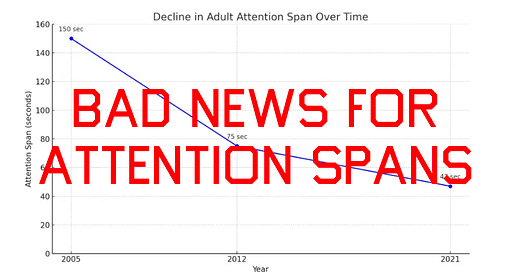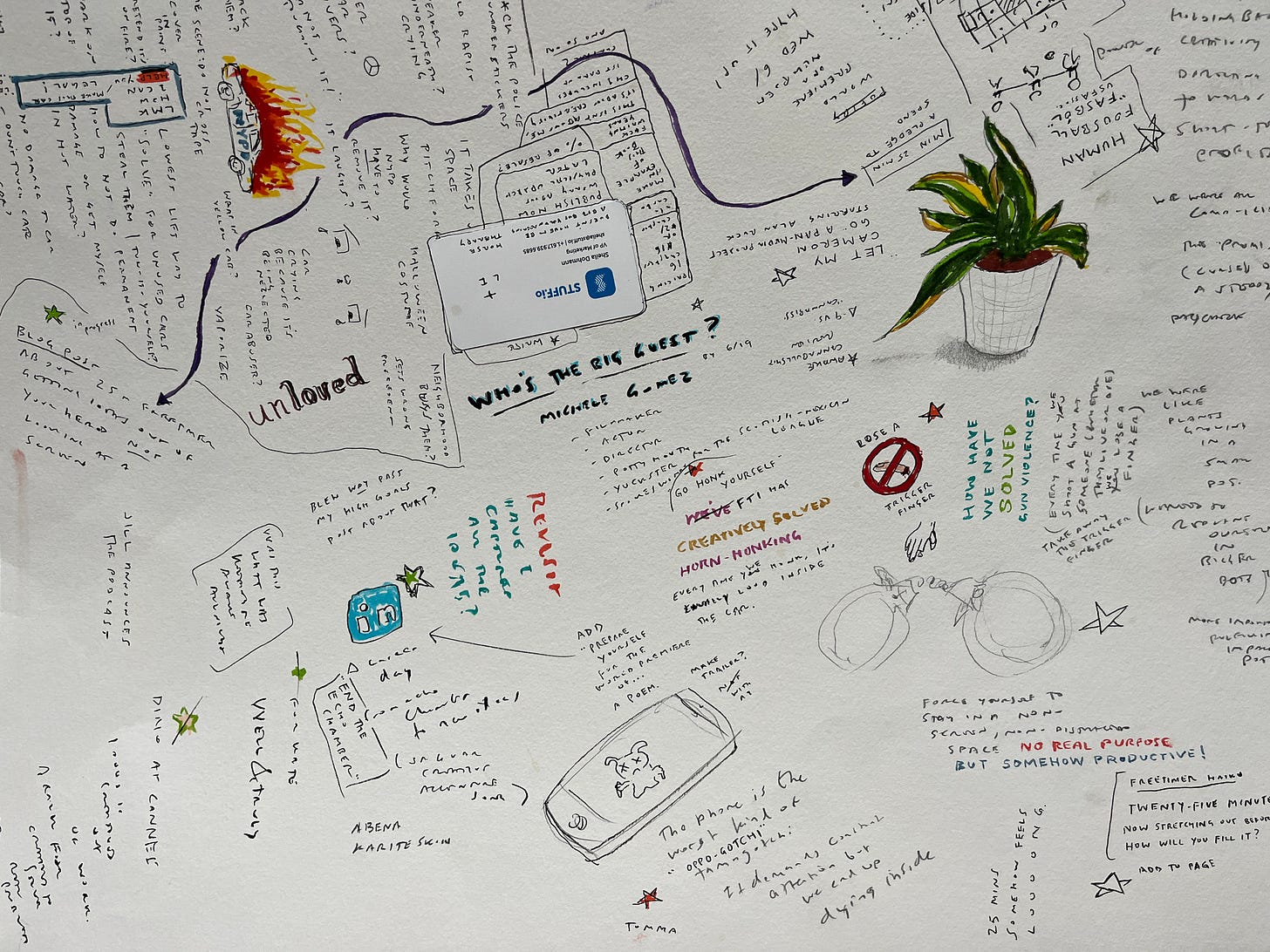ATTN: Your Attention Span's Shorter
Your attention span is stubbier than ever: Here's a way to get it back
Dear Attention Span:
You’re slowly vanishing and unless we do something about it, you’ll soon be gone altogether. Won’t you please stay with me and read the below? It could help return you to your former — and very lengthy — glory.
Love,
Yourself
Adult’s attention spans are decreasing rapidly, according to Gloria Mark a professor of informatics at the UC/Irvine (and the author of Attention Span: A Groundbreaking Way to Restore Balance, Happiness and Productivity).
In 2005, the average attention span measured 150 seconds in duration. Then in 2021, it was down to a paltry 47 seconds. At this rate, an adult’s attention span will be ~18 seconds in 2030 (the perfect amount to become a nation of TikTokers).
Lots of focus is being put on attention span these days. Per this New York Magazine article by Rebecca Jennings, there’s tons of lit being generated around the topic:
Multiple best sellers in recent years have attempted to diagnose or cure this problem, from Johann Hari’s Stolen Focus to Jenny Odell’s How to Do Nothing to Anna Lembke’s Dopamine Nation, while others, including Jean Twenge’s iGen and Jonathan Haidt’s The Anxious Generation, blame much of the distractibility and misery of young people on smartphones and social media.
Let’s not forget Chris Hayes’ recent book The Sirens’ Call: How Attention Became the World's Most Endangered Resource. It’s ironic that an on-air personality minted by MSNBC — and the attention-span devouring 24/7 political news cycle — wrote a book on the damage wreaked by an “…assault from attention capitalism.”
But the only one to blame for your Napoleonically short attention span is yourself. The Sirens may be constantly calling, but it’s up to you to lash yourself to the metaphorical mast and avoid responding to their song.
—
How can you embark on an Odyssey to improve you focus and increase your attention span? Well, the NYTimes recommends…looking at a screen even more! (It’s no surprise that a media property wants you to spend more of your precious moments on their site.)
In order to make a meaningful difference within yourself, you must leave your screens behind entirely. Here’s something that’s “proven” to work (at least for the author):
25-Minute Travels
STEP 1: As Ashton Kutcher famously said: “Your email inbox is everyone else's to-do list." Every algorithm on every news and social media platform is basically generating a thousand To-Dos per minute for you. So first, get the hell away from your screens and all their power to distract.
STEP 2: Gently force yourself to sit in front of a blank sheet of (physical 3D) paper for 25 minutes and fill it with whatever random thoughts pop into your head. Using multiple colored pens/pencils will make things more interesting, and doodling helps take up some of the time.
STEP 3: At the end of that distraction-free duration, see what’s useful or “actionable” and put stars next to those. These stars become a more focussed and important “To Do List” for your work, personal, and creative life.
Yes, the 25 minutes will feel long, but try it a couple times a week. Just don’t put too much pressure on yourself or the feeling of obligation will wear you down.
Have you used other strategies to increase your attention span?
Speaking of short attention spans: How’s an American supposed to stay interested in a soccer/futbol match for 90+ minutes? Arena football never took off. But I think I found the solution during one of my 25-Minute Travels…
Introducing: Human Foosball
Players are attached via hip-harness with bungee cords, recreating — in human scale — the fast-paced, high-scoring tabletop game.


But with Human Foosball, the stakes are higher: If players don’t move with their attached teammate, they get “snapped” back at high velocity.
What do you think? Would you watch Messi play this game?
—
To put you in the mood of expanding your own attention span, here’s a haiku for you:
Twenty-five minutes
stretching into the distance.
Where will they take you?





